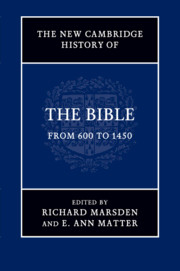Book contents
- Frontmatter
- Contents
- Figures
- Contributors
- Preface
- Abbreviations
- Abbreviations of books of the Bible
- Table of Psalm numbering
- Introduction
- Part I Texts and Versions
- 1 The Hebrew Bible
- 2 The Greek Christian Bible
- 3 Jewish Greek Bible versions
- 4 The Latin Bible, c. 600 to c. 900
- 5 The Latin Bible, c. 900 to the Council of Trent, 1546
- 6 The Bible in Ethiopic
- 7 The Bible in Arabic
- 8 The Bible in Armenian
- 9 The Bible in Georgian
- 10 The Bible in Slavonic
- 11 The Bible in Germanic
- 12 The Bible in English
- 13 The Bible in the languages of Scandinavia
- 14 The Bible in French
- 15 The Bible in Italian
- 16 The Bible in Spanish and Catalan
- Part II Format and Transmission
- Part III The Bible Interpreted
- Part IV The Bible in Use
- Part V The Bible Transformed
- Bibliography
- Index of biblical manuscripts
- Index of scriptural sources
- General index
- References
12 - The Bible in English
from Part I - Texts and Versions
Published online by Cambridge University Press: 28 May 2012
- Frontmatter
- Contents
- Figures
- Contributors
- Preface
- Abbreviations
- Abbreviations of books of the Bible
- Table of Psalm numbering
- Introduction
- Part I Texts and Versions
- 1 The Hebrew Bible
- 2 The Greek Christian Bible
- 3 Jewish Greek Bible versions
- 4 The Latin Bible, c. 600 to c. 900
- 5 The Latin Bible, c. 900 to the Council of Trent, 1546
- 6 The Bible in Ethiopic
- 7 The Bible in Arabic
- 8 The Bible in Armenian
- 9 The Bible in Georgian
- 10 The Bible in Slavonic
- 11 The Bible in Germanic
- 12 The Bible in English
- 13 The Bible in the languages of Scandinavia
- 14 The Bible in French
- 15 The Bible in Italian
- 16 The Bible in Spanish and Catalan
- Part II Format and Transmission
- Part III The Bible Interpreted
- Part IV The Bible in Use
- Part V The Bible Transformed
- Bibliography
- Index of biblical manuscripts
- Index of scriptural sources
- General index
- References
Summary
Large parts of the Bible have been available in the English language continuously for more than 1100 years, a record unequalled by any of the other language communities of western Christendom. This venerable tradition was invoked in the sixteenth century by apologists for the legitimacy of vernacular translation, who looked to the earliest English efforts to justify their own; the examples of both Bede and King Alfred were emphasised (the former with dubious justification, as we shall see). A preoccupation with the legitimacy of translation has itself a long pedigree in England; already in the ninth century a discourse of justification by historical precedent, based on the analogy of the vernacular status of the original Latin and Greek scriptures, was being rehearsed.
The assertion of continuity in the ‘englishing’ of the Bible (the verb was in use thus by the fourteenth century) must be qualified, however. For one thing, it would be a mistake to equate the motivations of the earliest translators, who worked in a monastic (and often aristocratic) context and within a more or less unified church, with those of their late medieval successors, who aimed directly at a popular audience and for whom translation would become a political act and a symptom of fracture in the church. There was linguistic disruption, too. The Norman dispensation that was established in England after 1066 not only brought a French-speaking elite (who would soon have scripture in their own tongue) but also reasserted the primacy of Latin in church and monastery. English as a written language lost its status, though never its vitality, for several hundred years. By the time that any substantial continuous direct English translation of scripture was tried again, in the fourteenth century, radical changes in the vocabulary and grammar of the language ensured that the older translations were no longer easily accessible. New translators used what could seem like a new language. It will be appropriate, therefore, to survey the history of scripture in English within discrete chronological sections, though the continuities between them will be stressed also.
- Type
- Chapter
- Information
- The New Cambridge History of the Bible , pp. 217 - 238Publisher: Cambridge University PressPrint publication year: 2012
References
- 4
- Cited by



